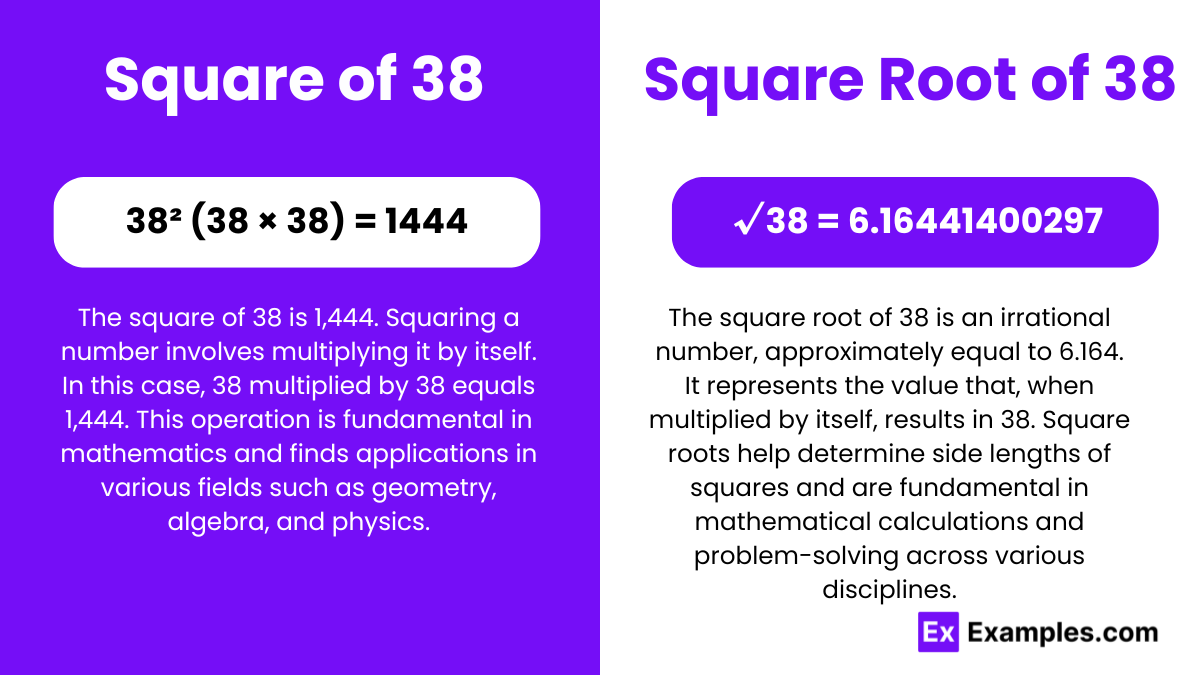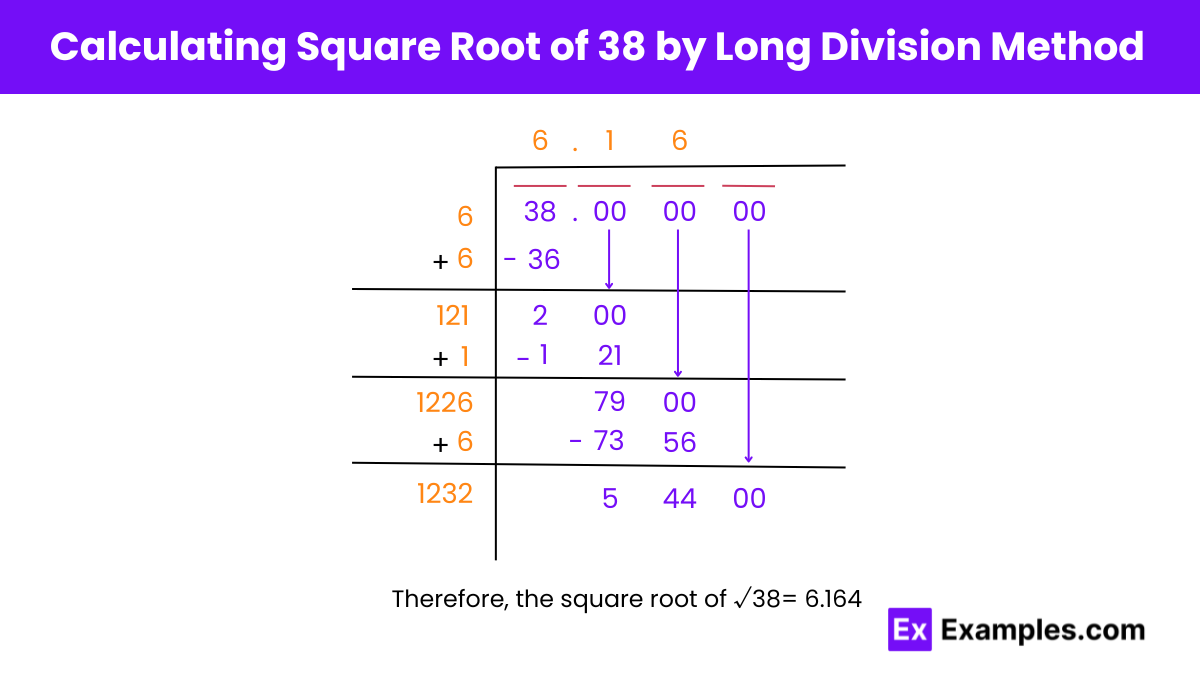What is the square of 38?
1368
1372
1444
1448


In the domain of mathematics, particularly within algebraic studies, the foundational principles of squares and square roots are pivotal. Squaring, demonstrated by multiplying a number like 38 by itself to yield 1444, is fundamental. It’s a cornerstone in exploring rational numbers (expressible as fractions of two integers) and irrational numbers (resisting neat fraction expression). Understanding these basics enriches comprehension of mathematical patterns and relationships, offering insights into the intricate fabric of mathematical theory.
38² (38 × 38) = 1444
The square of 38 is 1,444. A square number results from multiplying a number by itself. In this case, 38 multiplied by 38 equals 1,444. Square numbers are fundamental in mathematics, serving as the basis for exploring various concepts such as area, multiplication, and geometric properties.
√38 = 6.16441400297
Or
√38 = 6.164 Upto 3 decimals
The square root of 38 is approximately 6.164. The square root of a number is a value that, when multiplied by itself, equals the original number. Therefore, the square root of 38 represents the side length of a square with an area of 38 square units.
Square Root of 38: 6.16441400297
Exponential Form: 38^½ or 38^0.5
Radical Form: √38
The square root of 38 is an irrational number
The square root of 38 is irrational. It cannot be expressed as a fraction of two integers. Its decimal representation is non-repeating and non-terminating, characteristic of irrational numbers.
Rational Number:
A rational number can be expressed as a fraction of two integers, denoted as a/b, where the denominator isn’t zero. Examples encompass positive, negative, or zero values, like 3/4, -5/2, 0, 1, -2, etc.
Example: For instance, consider 3/4; since both 3 and 4 are integers, and the denominator isn’t zero, 3/4 is rational.
Irrational Number:
An irrational number, such as √2 or π, cannot be expressed as a fraction of two integers. Its decimal expansion neither ends nor repeats, thus it defies representation in the form a/b.
Example: Take √2; it has a non-repeating, non-terminating decimal expansion (√2 ≈ 1.41421356…), rendering it irrational.
To find the square root of 38, you can use various methods:
Estimation: Approximate the square root using nearby perfect squares (e.g., √36 = 6, √49 = 7) to get an initial guess.
Prime Factorization: Break down 38 into its prime factors (2 × 19) to simplify and find the square root.
Iteration: Use iterative algorithms like Newton’s method or the Babylonian method to refine an initial guess iteratively until convergence.
Calculator: Utilize a calculator or computer software to directly calculate the square root of 38.

Long Division Method for Finding the Square Root of 38
Step 1: Pairing Digits
Step 2: Initial Division
Step 3: Updating Dividend
Step 4: Iterative Division
Step 5: Iterative Process
No, 38 is not a perfect square number
38 is not a perfect square because its square root is not an integer. The square root of 38 is an irrational number, meaning it cannot be expressed as a simple fraction and its decimal representation goes on indefinitely without repeating.
The square of 38 can be expressed as 38².
The square of 38 is larger than the squares of numbers less than 38 and smaller than the squares of numbers greater than 38.
The square root of 38 rounded to the nearest integer is 6.
The square root of 38 has an infinite number of digits after the decimal point.
The square root of 38 may be used in various mathematical calculations and engineering applications.
You can check by finding its square root. If the square root is an integer, then 38 is a perfect square.
Text prompt
Add Tone
10 Examples of Public speaking
20 Examples of Gas lighting
What is the square of 38?
1368
1372
1444
1448
Which of the following is closest to the square root of 38?
6.1
6.2
6.3
6.4
If x² = 38, what is x?
6.1
6.2
6.3
6.4
Simplify √38 to its decimal form.
6.12
6.14
6.16
6.18
What is (38)²?
1369
1372
1444
1448
Find the approximate value of √38 to two decimal places.
6.10
6.12
6.14
6.16
Which number is not a square of an integer but closest to 38?
36
37
39
40
What is the value of 38 raised to the power of 0.5?
6.12
6.14
6.16
6.18
Calculate 38 × 38.
1368
1372
1440
1444
What is the approximate value of √38 between which two integers?
6 and 7
5 and 6
4 and 5
7 and 8
Before you leave, take our quick quiz to enhance your learning!

